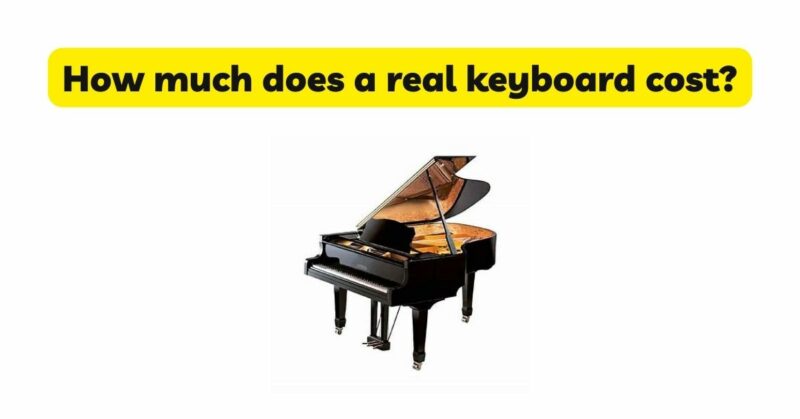Investing in a real keyboard, whether it’s an acoustic piano or a high-quality digital instrument, is a significant decision for any musician. The cost of a real keyboard can vary greatly depending on factors such as the type of keyboard, brand reputation, size, materials used, craftsmanship, and additional features. This article aims to provide insights into the cost range of authentic keyboards, helping you understand the investment required for these instruments. By considering various factors and understanding the value they provide, you can make an informed decision that aligns with your musical aspirations and budget.
- Acoustic Pianos:
Acoustic pianos offer an authentic and timeless playing experience, but they come with a higher price tag due to their craftsmanship, materials, and complexity. Acoustic pianos can be categorized into two main types: upright pianos and grand pianos.
a. Upright Pianos: Upright pianos are a popular choice for musicians seeking an acoustic piano experience in a more compact form. The cost of an upright piano can vary depending on factors such as the brand, size, age, condition, and quality of materials used. Entry-level upright pianos may start from around $3,000 to $5,000. Mid-range models, offering better sound quality and construction, can range from $5,000 to $10,000 or more. Higher-end upright pianos with superior craftsmanship, tonal characteristics, and longevity can range from $10,000 to $30,000 or higher.
b. Grand Pianos: Grand pianos, renowned for their superior sound and exquisite design, are often the choice of professional musicians, institutions, and dedicated enthusiasts. The cost of a grand piano is influenced by factors such as the brand, size, age, condition, and craftsmanship. Baby grand pianos, measuring around 5 to 6 feet in length, can start from $10,000 to $30,000. Medium-sized grand pianos, ranging from 6 to 7 feet, can cost between $30,000 and $70,000 or more. Concert grand pianos, measuring over 7 feet, can reach prices exceeding $100,000, depending on the brand and quality.
- High-Quality Digital Keyboards:
Digital keyboards have become increasingly popular due to their versatility, technological advancements, and affordability compared to acoustic pianos. High-quality digital keyboards strive to replicate the sound and feel of an acoustic piano while offering additional features and convenience. The cost of these instruments varies depending on the brand, features, sound quality, and build quality.
a. Stage Pianos and Portable Keyboards: Stage pianos and portable keyboards are designed for professional musicians, live performances, and studio recordings. They offer authentic piano sounds, realistic key action, and additional features. The cost of stage pianos can range from $1,000 to $3,000 or more, depending on the brand and features. Portable keyboards, offering a more compact and portable option, can range from $500 to $2,000 or more, depending on the brand and quality.
b. Home Digital Pianos: Home digital pianos provide an authentic playing experience for pianists in a home setting. These keyboards often feature furniture-style cabinets, enhanced sound systems, and a range of features for practice and enjoyment. The cost of home digital pianos can range from $1,000 to $3,000 or more, depending on the brand, size, features, and sound quality.
c. Workstations and Synthesizers: Workstations and synthesizers are advanced digital keyboards designed for professional musicians, composers, and sound designers. These instruments offer extensive sound manipulation, recording capabilities, and advanced features. The cost of workstations and synthesizers can range from $2,000 to $5,000 or more, depending on the brand, features, and specifications.
- Factors Influencing the Cost:
a. Brand Reputation: Brand reputation plays a significant role in the cost of a real keyboard. Established and renowned brands with a history of producing high-quality instruments often command higher prices due to their reputation, craftsmanship, and research and development investments. Brands such as Yamaha, Steinway & Sons, Kawai, Roland, and Casio have built a reputation for reliability and quality, which is reflected in their pricing.
b. Craftsmanship and Materials: The craftsmanship and materials used in the construction of a keyboard significantly impact its cost. High-quality acoustic pianos are built with precision, utilizing premium materials such as solid wood, spruce soundboards, and high-grade components. Similarly, high-quality digital keyboards feature superior key action, sound samples, and robust construction to replicate the touch and sound of an acoustic piano.
c. Size and Complexity: The size and complexity of a keyboard can influence its cost. Larger grand pianos require more materials and intricate craftsmanship, leading to higher prices. Similarly, advanced digital keyboards with a wide range of features and sound manipulation capabilities may have a higher price tag compared to simpler models.
d. Additional Features: Additional features such as recording capabilities, connectivity options, advanced sound manipulation, and educational functions can increase the cost of a keyboard. Consider the features that are essential to your musical aspirations and learning goals when evaluating the value they provide.
Conclusion:
The cost of a real keyboard, whether it’s an acoustic piano or a high-quality digital instrument, can vary significantly based on factors such as type, brand reputation, craftsmanship, materials used, and additional features. Acoustic pianos, including upright pianos and grand pianos, offer an authentic playing experience and can range from a few thousand dollars to tens of thousands of dollars. High-quality digital keyboards provide versatility, convenience, and a range of features, with prices ranging from a few hundred dollars for entry-level models to several thousand dollars for advanced instruments.
When considering the cost of a real keyboard, it’s essential to evaluate factors such as brand reputation, craftsmanship, materials, size, complexity, and additional features. Consider your musical aspirations, budget, available space, and long-term commitment to playing the keyboard. Whether you choose an acoustic piano or a high-quality digital keyboard, investing in a real keyboard offers a rewarding and inspiring musical experience that can accompany you on your musical journey for years to come.


